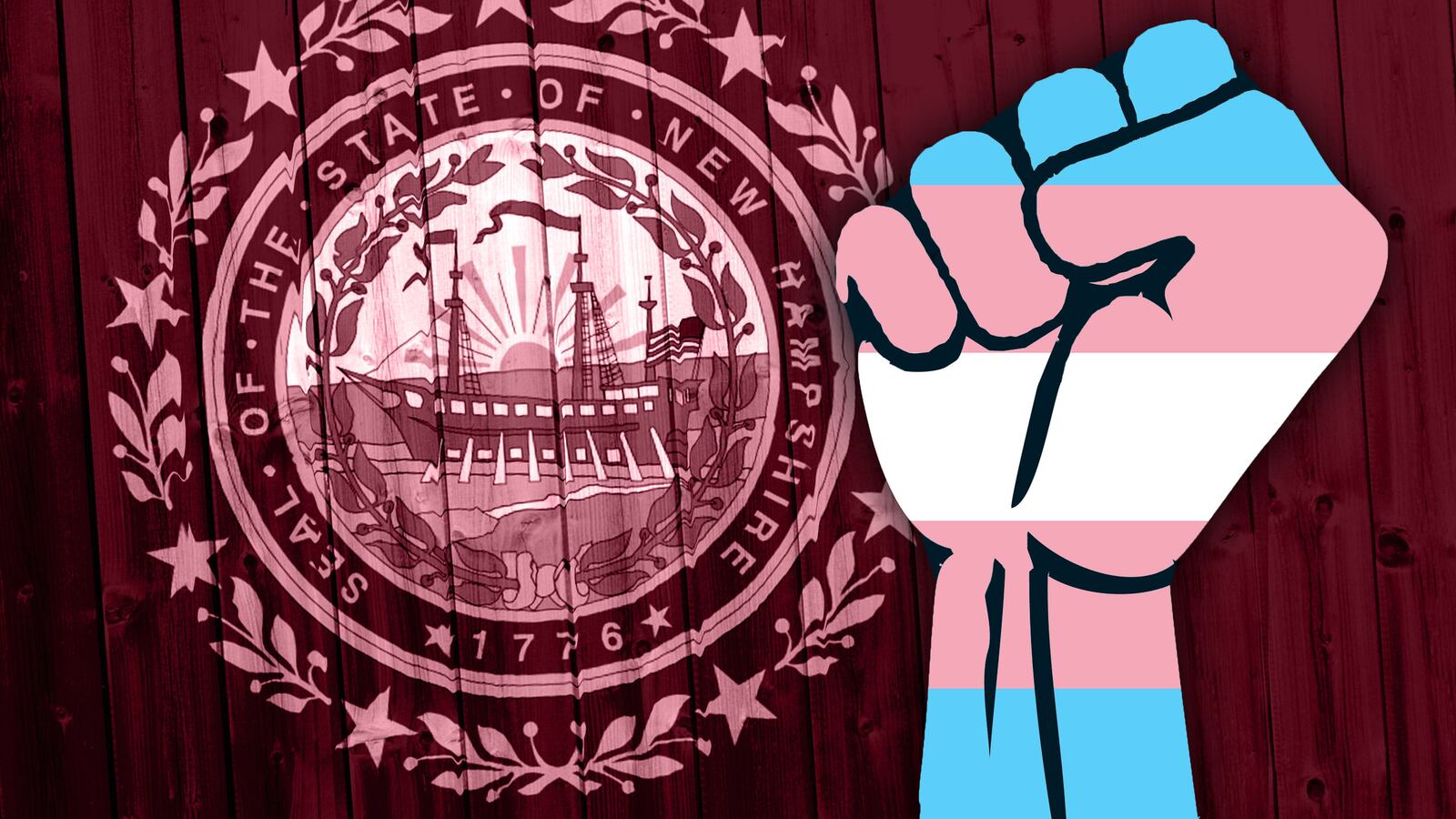New Hampshire is the only state in New England that doesn’t yet have statewide protections for transgender people. But LGBT advocates believe that 2018 is the year when the Granite State will finally join its neighbors—after House Bill 478, the last legislative attempt to protect transgender people, got tabled last year.
The legislation itself hasn’t changed a bit. The new bill, like HB 478, would simply add the category of gender identity to New Hampshire’s existing non-discrimination legislation, which covers employment, housing, and public accommodations.
“We are introducing the bill with the same exact language, the same protections—it just has a different bill number this year,” said Linds Jakows, campaign manager for the organization Freedom New Hampshire in an interview with The Daily Beast.
But what gives the bill—now known as House Bill 1319—a better chance at passing, says Jakows, is the public education campaign that Freedom New Hampshire has been running since last year, when the House of Representatives voted 187-179 to table HB 478. That campaign has involved everything from house parties to coffee meet-ups to “Ask A Trans Person Anything” panels when, as the name implies, members of the public are encouraged to ask transgender panelists any question they might have.
“We know this is a new issue for a lot of people,” Jakows acknowledged, “and a lot of people haven’t yet had the opportunity to get to know someone who’s transgender.” According to Pew Research Center data, only 30 percent of Americans say they know someone who is transgender, as compared to 87 percent who say they knew someone who is gay or lesbian—and there’s initial evidence, as Science Magazine reported that face-to-face interactions can help reduce anti-transgender prejudice. Freedom New Hampshire is hoping that the increased face time with transgender people over the past year will help the bill get the support it needs.
“It really makes a big difference when people get to hear stories of discrimination, and get to hear about what that’s like, because it’s something that’s fairly new in getting media attention,” said Jakows.
Last year, the myth that transgender people pose a threat in public restrooms was “pretty effective in killing the bill,” as Jakows recalled. As The Daily Beast previously reported, the conservative organization Cornerstone encouraged New Hampshire citizens to send a form letter to state representatives saying that House Bill 478 would “[put] the safety of women and children at risk.” Even though the bipartisan bill got out of committee by a margin of 15-2, the campaign against the bill eventually sank it.
This year, House Bill 1319 once again has bipartisan cosponsors—some of whom, Jakows told The Daily Beast, were “honestly not ready to vote with us last year and have learned more over the past year”—and it will have to pass through the Republican-chaired House Judiciary Committee before making it to the floor. Freedom New Hampshire anticipates the eight-vote margin by which HB 478 was tabled being narrowed and hopefully overcome this time around.
But, as NHPR reported, Cornerstone has renewed its opposition to the bill, releasing a fact sheet that claims the bill “will violate your right to safety and privacy in settings such as locker rooms and restrooms.” In fact, criminal statutes are still applicable to anyone who violates privacy in a restroom and non-discrimination protections for transgender people in other states have not led to any documented rise in restroom assaults.
There are signs that HB 1319, which will be heard sometime before the end of February, could make it further than HB 478–and potentially all the way to Republican Governor Chris Sununu’s desk.
For one, the Portsmouth Herald editorial board enthusiastically endorsed the bill, asking New Hampshire state legislators who opposed HB 478 to “open their hears and minds and listen to transgender people when they talk about their lives.”
The paper also published an extensive feature story on the bill, sharing the personal stories of New Hampshire transgender residents and highlighting the fact that 15 percent of the state’s respondents to the 2015 U.S. Transgender Survey said that they had lost a job due to discrimination.
Although Governor Sununu has not endorsed the bill, Jakows points to the fact that he established an Advisory Council on Diversity and Inclusion in December as evidence that he may eventually be amenable to signing HB 1319 into law.
“He hasn’t come out explicitly but we think that he’s definitely moving in the right direction and we would love to see some leadership on that issue,” said Jakows.
But until HB 1319–or one of its successors—manages to become law, New Hampshire will remain out of step with the rest of New England when it comes to offering transgender protections. Jakows says that this disparity has proved to be confusing for companies with employees spread across the region.
“The fact that we are the only New England state without those protections means that there’s a lot of uncertainty in the law,” Jakows said. “And businesses that operate in multiple states are often unsure who’s protected and who’s not.”
And as spring approaches, there’s another pressing economic concern: LGBT tourists, or even families of transgender people, who may opt for a different northerly destination.
“I have a number of friends who avoid New Hampshire,” Gerri Cannon, a local school board member who was one of the seven transgender candidates that won elections last November, told the Portsmouth Herald. “They’ll come to New England, they’ll come to Maine, Massachusetts, Vermont, Rhode Island, and Connecticut, but they’ll avoid New Hampshire.” “A lot of people look at what states are safe for them when they plan on going on vacation,” Jakows told The Daily Beast. “So we really want to bring New Hampshire up to date with the rest of New England.”






